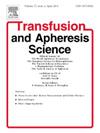Evaluating the safety and efficacy of plasma therapy/plasmapheresis for systemic sclerosis – A comprehensive systematic review
IF 1.4
4区 医学
Q4 HEMATOLOGY
引用次数: 0
Abstract
Introduction
Systemic sclerosis (SSc) is an autoimmune disorder with fibrosis in multiple organs, autoantibodies, and microvascular abnormalities. Its origin is unclear, but it may result from circulatory damage, collagen metabolism disruption, and modifications in immunoregulation. The disease affects various organs and has high morbidity and mortality rates. SSc-related complications are managed using immunosuppressive medications that target autoantibodies. The main objective of this study was to assess the safety and efficacy of plasma therapy/plasmapheresis in managing SSc.
Methods
This systematic review followed PRISMA and IMRAD guidelines, using PICO framework for study selection based on MeSH terms and Boolean operators. It included cross-sectional, randomized control trials, and clinical studies on plasma therapy for SSc. Standardized protocols were used for data extraction and risk of bias assessment.
Discussion
Plasma therapy is a growing treatment option for managing SSc with reported benefits, especially in early stages and specific organ complications. However, further investigation and standardized protocols are needed. This review explores the potential of plasma therapy in improving the quality of life for SSc patients and in combination with other treatments.
Result
The review analyzed 15 articles, including research papers, controlled trials, and case reports. Plasma therapy, involving Plasmapheresis and therapeutic plasma exchange (TPE), improved symptoms of SSc like Raynaud phenomenon, vasculitis, muscle dysfunction, and digital ulcers. However, outcomes varied among studies, and some advanced cases showed limited benefits.
Conclusion
Plasma therapy can be an effective way of managing the symptoms of systemic sclerosis with low incidence of adverse events. However, the exact mechanism behind this treatment is still unclear. Therefore, additional studies are required.
评价血浆治疗/血浆置换治疗系统性硬化症的安全性和有效性——一项全面的系统综述
系统性硬化症(SSc)是一种自身免疫性疾病,伴有多器官纤维化、自身抗体和微血管异常。其起源尚不清楚,但可能由循环损伤、胶原代谢中断和免疫调节改变引起。这种疾病影响各个器官,发病率和死亡率都很高。ssc相关的并发症是使用针对自身抗体的免疫抑制药物来管理的。本研究的主要目的是评估血浆治疗/血浆置换治疗SSc的安全性和有效性。方法本系统综述遵循PRISMA和IMRAD指南,采用PICO框架基于MeSH术语和布尔运算符进行研究选择。其中包括血浆治疗SSc的横断面、随机对照试验和临床研究。采用标准化方案进行数据提取和偏倚风险评估。血浆治疗是治疗SSc的一种日益增长的治疗选择,有报道称其有益,特别是在早期阶段和特定器官并发症中。然而,需要进一步的调查和标准化的方案。这篇综述探讨了血浆治疗在改善SSc患者生活质量方面的潜力,并与其他治疗相结合。结果本综述分析了15篇文献,包括研究论文、对照试验和病例报告。血浆治疗,包括血浆置换和治疗性血浆交换(TPE),改善了SSc的症状,如雷诺现象、血管炎、肌肉功能障碍和指部溃疡。然而,不同研究的结果不同,一些晚期病例显示出有限的益处。结论血浆治疗是治疗系统性硬化症的有效方法,不良事件发生率低。然而,这种治疗背后的确切机制尚不清楚。因此,需要进一步的研究。
本文章由计算机程序翻译,如有差异,请以英文原文为准。
求助全文
约1分钟内获得全文
求助全文
来源期刊
CiteScore
3.60
自引率
5.30%
发文量
181
审稿时长
42 days
期刊介绍:
Transfusion and Apheresis Science brings comprehensive and up-to-date information to physicians and health care professionals involved in the rapidly changing fields of transfusion medicine, hemostasis and apheresis. The journal presents original articles relating to scientific and clinical studies in the areas of immunohematology, transfusion practice, bleeding and thrombotic disorders and both therapeutic and donor apheresis including hematopoietic stem cells. Topics covered include the collection and processing of blood, compatibility testing and guidelines for the use of blood products, as well as screening for and transmission of blood-borne diseases. All areas of apheresis - therapeutic and collection - are also addressed. We would like to specifically encourage allied health professionals in this area to submit manuscripts that relate to improved patient and donor care, technical aspects and educational issues.
Transfusion and Apheresis Science features a "Theme" section which includes, in each issue, a group of papers designed to review a specific topic of current importance in transfusion and hemostasis for the discussion of topical issues specific to apheresis and focuses on the operators'' viewpoint. Another section is "What''s Happening" which provides informal reporting of activities in the field. In addition, brief case reports and Letters to the Editor, as well as reviews of meetings and events of general interest, and a listing of recent patents make the journal a complete source of information for practitioners of transfusion, hemostasis and apheresis science. Immediate dissemination of important information is ensured by the commitment of Transfusion and Apheresis Science to rapid publication of both symposia and submitted papers.

 求助内容:
求助内容: 应助结果提醒方式:
应助结果提醒方式:


